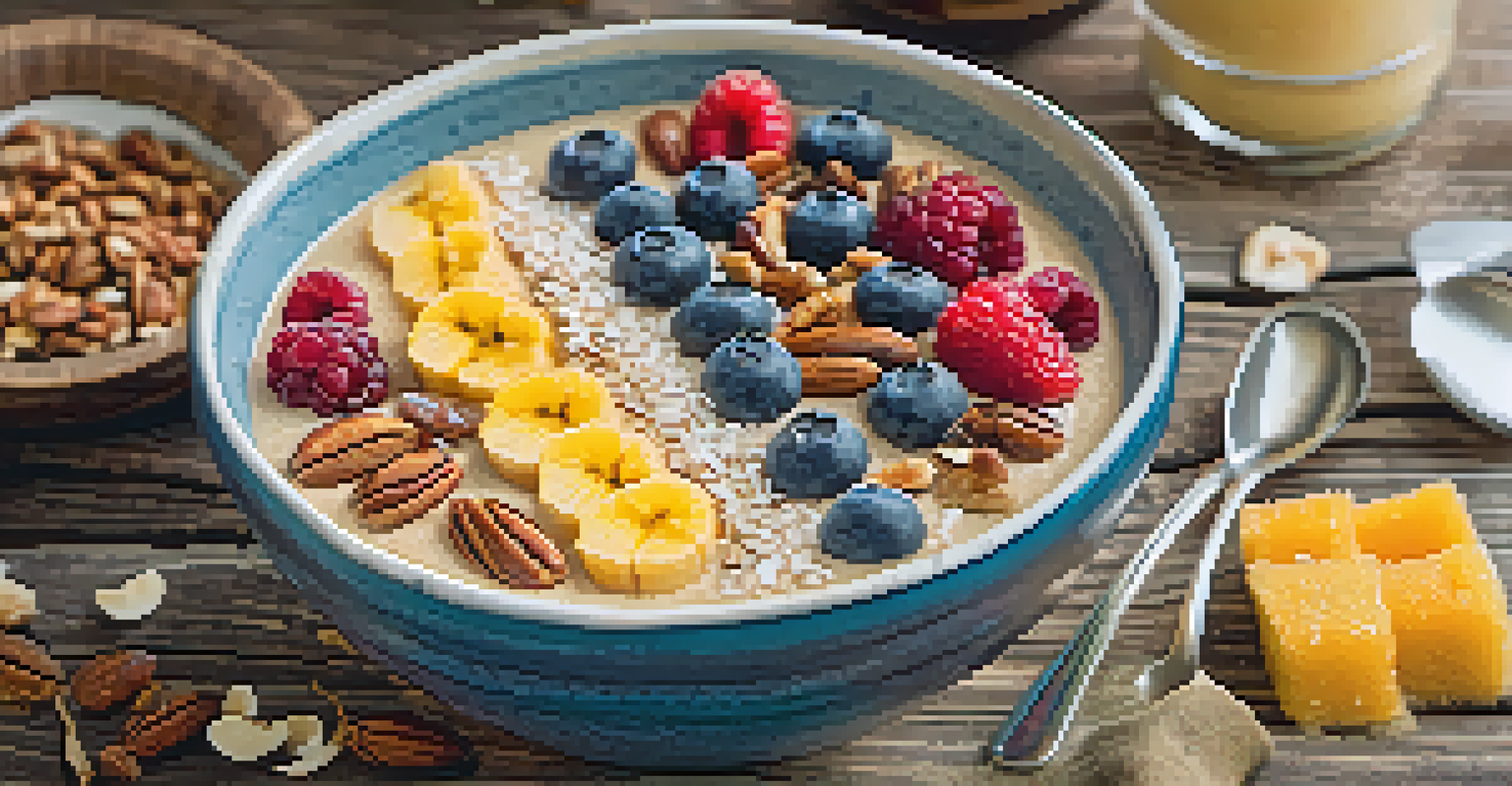The Best Plant-Based Sweeteners for Baking and Cooking

Understanding Plant-Based Sweeteners: A Quick Overview
Plant-based sweeteners are natural alternatives to refined sugars, perfect for those looking to enhance their baking and cooking without compromising on taste. These sweeteners can come from various sources, including fruits, plants, and even certain grains. By using plant-based options, you not only reduce your sugar intake but also introduce unique flavors and health benefits into your dishes.
Let food be thy medicine and medicine be thy food.
For instance, many plant-based sweeteners have a lower glycemic index than traditional sugar, which means they can help maintain stable blood sugar levels. This is particularly beneficial for people with diabetes or anyone looking to manage their energy levels throughout the day. Additionally, many of these sweeteners contain vitamins and minerals, adding nutritional value to your recipes.
In this article, we'll explore some of the best plant-based sweeteners available, how to use them effectively in your recipes, and their distinct flavor profiles. Whether you're an experienced baker or just starting out, these options can elevate your dishes while keeping them health-conscious.
Agave Nectar: A Versatile Liquid Sweetener
Agave nectar is a popular liquid sweetener derived from the agave plant, known for its mild flavor and syrupy texture. It’s sweeter than sugar, which means you can use less of it in your recipes, making it a cost-effective option. This sweetener works wonderfully in beverages, dressings, and baking, providing moisture to cakes and muffins.

One of the key benefits of agave nectar is its low glycemic index, which means it won’t spike your blood sugar levels as quickly as traditional sugar. However, moderation is still essential, as it is high in fructose, which can be detrimental in large amounts. For those following a vegan diet, agave nectar is an excellent choice as it is wholly plant-based.
Plant-Based Sweeteners Overview
Plant-based sweeteners offer natural alternatives to refined sugars, enhancing flavors and providing health benefits.
When using agave nectar in baking, it’s essential to adjust your liquid ingredients since it’s a liquid sweetener. Generally, you can reduce the other liquids in your recipe by about 1/4 for every cup of agave used. This way, your baked goods will still have the perfect texture and flavor.
Maple Syrup: Nature’s Sweet Elixir
Maple syrup, made from the sap of sugar maple trees, is a beloved sweetener known for its rich flavor and distinct aroma. It pairs excellently with a range of dishes, from pancakes to marinades, and can even be used to add depth to baked goods. Its natural sweetness can elevate both sweet and savory recipes, making it a versatile kitchen staple.
The greatest wealth is health.
In addition to its delicious taste, maple syrup contains antioxidants and essential minerals like manganese and zinc, contributing to its health benefits. Unlike refined sugars, maple syrup has a lower glycemic index, which can be gentler on your blood sugar levels. However, it’s still important to use it in moderation to reap the benefits without overdoing it.
When substituting maple syrup for sugar in baking, remember that it’s liquid. A good rule of thumb is to reduce your other liquids by about 3 tablespoons for each cup of maple syrup used. This will help maintain the right consistency in your baked goods.
Coconut Sugar: The Sweetness of the Tropics
Coconut sugar is made from the sap of coconut palm trees and is gaining popularity as a natural sweetener. It has a caramel-like flavor that adds a unique twist to your baked goods, making it perfect for cookies, cakes, and muffins. Because it contains trace minerals, it is often considered a healthier alternative to refined sugar.
One of the most appealing aspects of coconut sugar is its lower glycemic index, which makes it a better option for those looking to manage their blood sugar levels. It’s also less processed than traditional sugars, retaining more of its natural nutrients. However, like all sweeteners, moderation is key to maintaining a balanced diet.
Versatile Sweeteners for Baking
Different plant-based sweeteners, like agave and maple syrup, can be used in baking with specific adjustments for optimal results.
When using coconut sugar in your recipes, you can typically substitute it for sugar in a 1:1 ratio. Keep in mind that it may slightly alter the flavor and color of your baked goods, but the result is often a deliciously rich taste that many find appealing.
Date Sugar: The Nutrient-Rich Sweetener
Date sugar is made from ground dehydrated dates and has a unique, rich flavor profile that can enhance many recipes. Unlike refined sugars, date sugar retains the fiber and nutrients found in whole dates, making it a healthier option for those seeking natural sweetness. It works well in baked goods, smoothies, and oatmeal, adding a chewy texture and depth of flavor.
One of the standout features of date sugar is its high nutrient content, including potassium, magnesium, and antioxidants. This makes it not only a sweetener but also a source of vitamins and minerals that can benefit your health. However, because it doesn’t dissolve as easily as other sweeteners, it’s best used in recipes where a bit of texture is welcome.
When using date sugar in baking, a good rule of thumb is to substitute it for sugar in a 1:1 ratio, but be aware that it may add a slightly darker color to your finished product. This rich color can be particularly appealing in cookies and brownies, giving them a homemade, rustic charm.
Stevia: The Zero-Calorie Sweetener
Stevia is a natural sweetener derived from the leaves of the Stevia rebaudiana plant and is well-known for being calorie-free. This makes it a popular choice for those looking to reduce caloric intake without sacrificing sweetness. Stevia can be found in various forms, including liquid, powder, and granules, making it incredibly versatile for use in a wide range of recipes.
One of the best things about stevia is its intense sweetness—it's estimated to be 50 to 300 times sweeter than sugar. This means only a small amount is needed to achieve the desired sweetness level. However, it’s important to use it judiciously, as too much can lead to a bitter aftertaste.
Experiment with Sweetener Choices
Choosing the right sweetener involves considering flavor, texture, and consistency, encouraging experimentation in recipes.
When using stevia in baking, it's crucial to follow the conversion guidelines since it doesn’t behave like sugar in recipes. Typically, you would use about 1 teaspoon of liquid stevia for every cup of sugar you're replacing. This adjustment ensures that your baked goods maintain the right balance of flavor and texture.
Brown Rice Syrup: A Sweet and Sticky Alternative
Brown rice syrup is made from whole grain brown rice and has a thick, sticky consistency that works well in baking and cooking. It offers a mild sweetness with a hint of nuttiness, making it a great addition to energy bars, granola, and even salad dressings. Its unique flavor can enhance many recipes, adding a layer of complexity that refined sugars simply can't match.
One advantage of brown rice syrup is that it has a low glycemic index compared to regular sugar, which means it can be a suitable option for those looking to manage blood sugar levels. However, it’s still essential to consume it in moderation, as it is still a form of sugar.

When substituting brown rice syrup for sugar in recipes, keep in mind that it’s a liquid sweetener. A good rule of thumb is to reduce other liquids by about 1/4 for every cup of brown rice syrup used. This will help maintain the correct consistency in your baked goods.
Choosing the Right Sweetener for Your Recipes
Selecting the right plant-based sweetener can make a significant difference in your baking and cooking endeavors. Consider the flavor profile you desire, as each sweetener brings its unique taste to the table. For instance, if you want a warm, rich flavor, maple syrup might be your best bet, while stevia is perfect for a calorie-free option.
It's also important to think about the texture and consistency of your dishes. Liquid sweeteners like agave and maple syrup can add moisture, while granulated options like coconut sugar and date sugar can provide texture. This consideration can help you achieve the perfect results in your culinary creations.
Lastly, don't hesitate to experiment! Each sweetener behaves differently in recipes, and finding the right balance may take some trial and error. By understanding the characteristics of each sweetener, you can create delicious, plant-based dishes that everyone will enjoy.